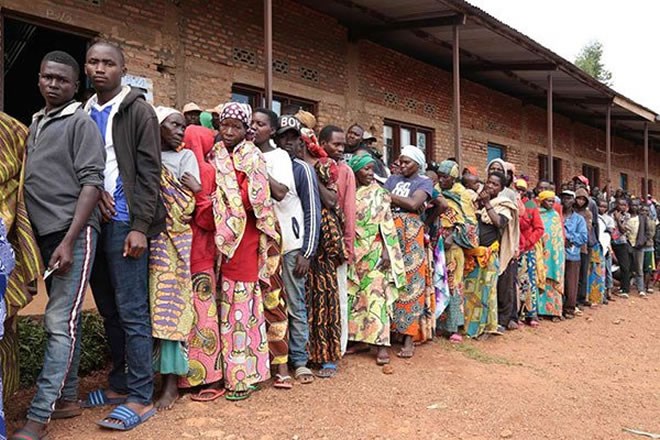by Liban Obsiye
Monday, May 25, 2020

Burundians wait in a line to vote during the general elections at a polling station in Bubu Primary School in Giheta, central Burundi, on May 20, 2020. PHOTO | AFP
Another Africa Day is upon us and, well, Africa remains Africa.
It is a uniquely beautiful, rich continent with a huge demographic dividend but also fiscally and socially the poorest in terms of development opportunities and outcomes.
Gloomy headlines on Africa are recurrent in the international press — such as debt, poverty, humanitarian crisis, political impasse, insecurity, illegal migration and poor governance. Yet, somehow, life continues. To transform Africa, this business-as-usual attitude must stop.
Africans must take the lead on their future. Africa must no longer be defined from the outside by diplomats, investors and even well-meaning academics who teach courses like African and development studies, often to African elites in faraway lands who ought to know this issue better than their instructors given their lived experience.
One of the first points of ignorance that Africans must enlighten the world on is that Africa is not a country, with one people.
It is vast, diverse and rich in macro- and micro traditions that span centuries. This story is best told by Africans proud of their heritage, celebrating the customs and traditions of their communities.
Identity politics in Africa is often a cause for concern, but cultural identity and its distinct traditions can promote tolerance and be the basis for a peaceful, more progressive Africa with good governance.
INSTITUTIONAL ANALYSIS
Africa cannot be understood without an appreciation and respect for its rich diversity. There is one Africa with billions of Africans.
To understand Africa, let’s stop the obsession with simplified definitions and packaged “developmental solutions” which promote a one-size-fits-all approach.
Ultimately, achieving the Africa “We want and Need”, as the African Union constantly reminds its membership, is up to Africans.
Indeed, African solutions for African problems would be great and some multilateral African institutions like the AU and regional bodies have taken up this task, albeit with mixed results.
However, solutions are not possible without a continental institutional analysis of why Africa still lags behind despite its enormous natural and human resource wealth.
There are, evidently, weak institutions, poor governance, confused and conflicting priorities, and a disorganisation for a continent with great ambitions but little cross-border cooperation.
It needs partnerships like South-South cooperation. States, entrepreneurs and policymakers must learn best practice from their international counterparts and indigenise and innovate.
INADEQUATE RESOURCES
The Covid-19 pandemic has highlighted how disconnected Africa is and how ill-prepared it is for socioeconomic shocks.
Some countries have fared well but most face acute crises with increasing cases. There is a shortages of expertise, equipment and health facilities.
Yet many of Africa’s most qualified health professionals work in Europe, Australia, the US and the Middle East, where they have better opportunities. The irony is, they cannot afford to save their people in Africa.
The AU, regional bodies and organisations and governments and international financial institutions must now plan for a post-Covid-19 Africa, which will need enormous investments to resuscitate weakened and fragile economies and protect the livelihoods of the vulnerable.
Mr Obsiye is a senior adviser to the Federal Government of Somalia. [email protected].